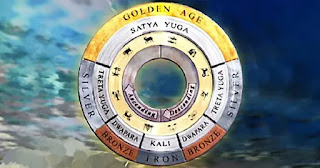The Kali yuga age highlights are as follows:
- The peak of humanity is passed.
- Rise in lawlessness and violence, leading to cruelty and disintegration. As a result, people become anti social and selfish. They tend to betray their friends for the sake of small gains, causing societies to fall apart. Women become prostitutes or slaves; men become thieves or slave owners; children abandon family life or turn into criminals. There is no 'society' anymore but rather groups of families that have banded together for protection against the evils around them.
The above is a summary of the highlights. The details follow:
1. The high point of humanity has been reached and the rate of progress is slowing down. This can be seen in various fields, such as science, government, education etc. For example:
a) Astronomy shows that the universe is expanding and has been since time began. The speed of expansion increases as time goes on, and eventually will be so fast there will be no point in traveling even at the speed of light. Our knowledge cannot increase faster than this rate.
b) Physics has shown that laws and constants are universal. We can never travel faster than the speed of light, or back in time for example.
c) Theories of the origin of mankind have been proposed and discarded. We will never discover an objective, scientific theory that explains the origin of man.
As we know from the vedic texts, there are four yugas in a cycle of time. The dvapara-yuga is the third age which lasts with virtues such as dharma and artha for 900 divine years followed by treta-yuga which has virtue of kama or pleasures for 1200 divine years and then comes the kali-yuga where there is virtue of neither dharma nor artha but only excessive sexual desires. It is described that after another 1430 years or so it will be replaced by next higher yuga i.e satya-yuga.
The kali-yuga was supposed to begin when the dvapara-yuga ended, which is said to have happened in 3102 B.C and hence we are now in about 6723th year of kali-yuga.
Many living in the western countries have not realized what has been happening as they are very attached to their own views and hence make mistakes because of which even those who understand it directly or indirectly do not want to mention them for fear that they might be called mad. Therefore, this topic is covered with a thin layer of deposits of ignorance.
When one is attached to pleasures of the senses, he or she will be a slave of his desires and not know what is good for him.
What you call as pleasure is illusion and those who are not aware of the true nature of self, fall for it like a deer into a trap.
Those who are attached to wealth and pleasures of the world live in their desires. When they succeed in getting what they want, it only results in more attachment and hence there is no end to such unending cycle.
The concept of Kali Yuga is a Hindu concept, and as such it has its roots in the Vedic tradition. The word 'kali' denotes darkness, while the term yuga means a period of time or epoch. In this context we can say that kali-yuga refers to an epoch of darkness in which mankind is believed to be living at present.
This epoch of darkness is believed to have begun when the 'tenth manvantara' came to an end. A manvantara is a period that lasts for 12,000 years and marks one cycle in the life of Earth. The tenth manvantar was supposedly ruled by King Mahabali, who was considered as a very virtuous king.
At the end of his reign, King Mahabali was expelled from this world and sent to 'Pitru Loka' or what we would today call hell.
The exiling of King Mahabali marks the beginning of kali-yuga. And it is believed that this epoch will last for 432,000 years before it comes to an end.
According to the Hindu belief, each age or yuga has its own characteristics and qualities. The present epoch is known as a 'tamasic' period where ignorance and darkness are said to be dominating.
The first of the four yugas, 'Satya-yuga', is supposed to be a period where virtue and truth prevailed. Likewise, the other three ages are called 'Treta' (referring to heroic deeds), 'Dwapara' (referring to passion) and finally 'Kali'. Each age has its own characteristics.


No comments:
Post a Comment